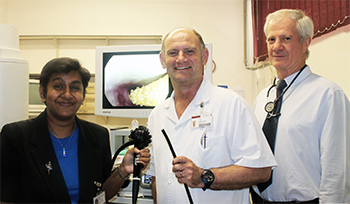Latest News Archive
Please select Category, Year, and then Month to display items
12 January 2024
|
Story Nonsindiswe Qwabe
|
Photo Sonia Small
 Since joining the UFS in 2008, Dr Grey Magaiza has worked extensively on approaches that can foster the socio-economic transformation of societies.
Since joining the UFS in 2008, Dr Grey Magaiza has worked extensively on approaches that can foster the socio-economic transformation of societies.
“The future should be one where communities can decide on their development agenda and futures. That’s the most important for me.” Dr Grey Magaiza, Deputy Director of the Centre for Gender and Africa Studies (CGAS) and Head of the Community Development programme on the Qwaqwa Campus, is passionate about capacitating communities to be agents of change and advancement. His vision for the future emphasises the empowerment of communities to take charge of their development by actively participating in decision making and the implementation of development projects that can improve their lives.
Since joining the UFS in 2008, Dr Magaiza has worked extensively on approaches that can foster the socio-economic transformation of societies. Over the years, he has crafted his research speciality into one that he is most proud of – being an interdisciplinary scientist immersed in the development of communities.
“I’m in a fortunate position of researching what I like. I say ‘fortunate’, because I’ve taken the time to understand what I’m passionate about, which is the overall field of rural livelihoods and livelihood futures – in short, community development. My research starts from an engaged university, understanding the elements that a university must use to enhance transformation and relevance to its immediate community in terms of development.”
One of the ways he has done this is by looking at social entrepreneurship as a development approach for young people in a rural setting. Through workshops with non-profit and civic organisations in Qwaqwa, Dr Magaiza has been helping these organisations to map out their needs and actively meet them through the involvement and support of external role players.
“We understand that communities are part of the national development agenda, but even that national agenda respects community knowledge and intentions and allows communities to shape their identity. A critical enabler of this is community organising. You bring back the capacity in communities to have dialogues on issues affecting them as spaces for engagement, knowledge exchange, and for people to just talk about their way forward.”
By enabling communities to define their development agenda, they can address their specific needs, challenges, and aspirations, he said. “When I look at livelihood futures, it’s quite an exciting aspect of my work – it’s like looking into a fortune tellers’ globe, because you’re not deciding for communities what they should do, but the communities themselves take those decisions.”
Gastroenterology Unit works to bring a transformative impact to healthcare
2016-11-21

Dr Rita Nathan, Acting CEO of Universitas Hospital,
Prof Willem Kruger, Acting Head of the
School of Medicine, and Prof Jan van Zyl,
Head of Department of Internal Medicine.
Photo: Nonsindiso Qwabe
The departments of Surgery and Internal Medicine at the University of Free State launched the newly upgraded Gastroenterology Unit of the Universitas Academic Hospital on 8 November 2016. Realising the need to provide state-of-the-art equipment that caters for various health needs, the unit has acquired new pieces of equipment worth R7 million. Through the equipment, a move towards the digital revolution, the unit hopes to bring about a transformative impact on healthcare service delivery in central South Africa and its surrounds.
Upgraded unit will make a difference on burden of diseases
Dr Rita Nathan, Acting CEO of the Universitas Hospital, said the increase in the number of scopes, and the improvement in technology, will facilitate improved service delivery to the community of the Free State and beyond. “This upgrade will enable the unit to make a tremendous dent in the burden of diseases in the communities we serve.”
Unit a unique feature in central South Africa
Serving a population from the Free State, Northern Cape, Eastern Cape and Lesotho; the growing demand of health services has led to an increase in the number of patients treated by the unit. This unit is unique in central South Africa as the only one providing endoscopic intervention for cases like gastrointestinal bleeding. It is also the only 24-hour gastroscopic service available in the state sector.
Improved service delivery linked to enhanced training platforms
Prof Willem Kruger, acting head of the School of Medicine, said that the upgrading of equipment will have an immense impact on not only service delivery, but also on training platforms in the latest technologies. “It important, as a university, that our doctors have the latest technology at their disposal to facilitate training. If training improves, service delivery improves. The two on inextricably linked.” he said.